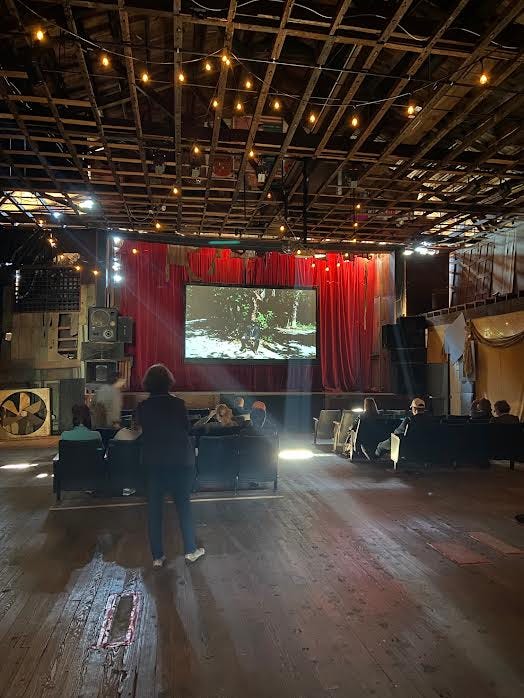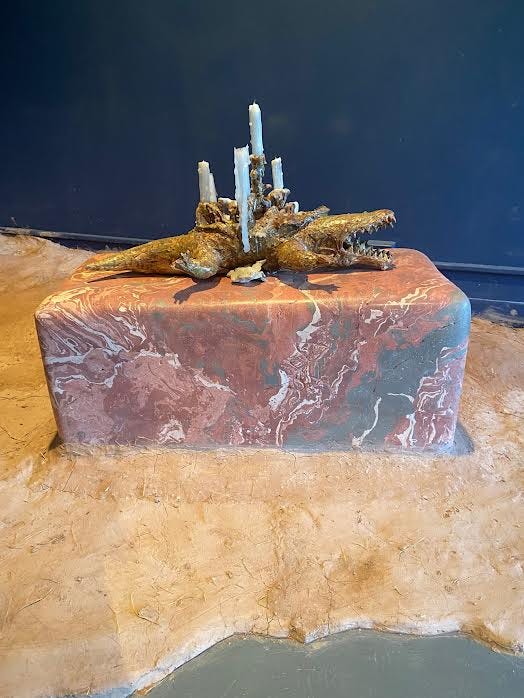These Little Wins
Hi friends.
I took a walk with my friend Katy this weekend. We hadn’t seen each other in a while so it ended up being a long walk. The day was sunny and clear, the color of the sky muted a bit in the new light of the season. It was chilly when we started, and warm by the end.
We walked through the neighborhood and down to the river and along it for a while and then back up through the Marigny, stopping to see some art installations along the way and to chat with some neighbors, too. Mostly we were catching up because Katy had been away for a while at a fancy artist’s residency, and texts just aren’t the same as real life.
I have actually been thinking lately about how easy it is to lie when typing on a screen, but I can never lie to myself when I handwrite. There’s something about typing things into a neat visual box that makes me want to alter or edit or tidy up the text, but when I’m handwriting, there is no need to fix the truth, and in fact, I would feel foolish or ashamed if I lied in my own notebook. The same applies to the ways we communicate with others, I think. When we text, we give the briefest of versions of our stories; we arrange ourselves for consumption. And when we walk and we talk, there is no point in tidying it up. We offer up our messiest selves. Or at least I do, anyway.
But I am not messy right now. Things are calm around here, two months out from my book launch. (The calm before the calm, is the publishing joke.) Alex was in town for my birthday and read my tarot cards for me, and there was a whole lot of waiting going on in those cards. One thing you can do while you wait is reach out to a friend or two.
Rodney McMillian @ Happy Land Theater
With my writer friends, when we meet, we often talk about our personal lives first, and our writing last. Because we could talk about our writing forever. There is always some new nook or cranny that needs to be explored. When we talk about writing we talk about our projects, how they’re going, if we’re making progress, the state of our professional relationships, what we’re reading, a little gossip here and there, and, if we’re really lucky, we get to talk about our triumphs, which are usually minor.
And I had one to share that day. One minor success.
I hadn’t touched my novel in probably two weeks because I’d been busy working on a few new essays, ones I was writing to help promote the forthcoming book. I’d had the new novel document open on my desktop for a while, but eventually, with a deep sigh, I’d closed it because I knew I wasn’t going to touch it. I’ll be back, I thought.
Two weeks away is a long time, and I’d missed the book, but was also going through that thing where you’re afraid when you go back to it, it will seem like a foreign language to you. Like did I suddenly learn French and now I write in French except I don’t know French? Or that maybe you’d realize it wasn’t what you were supposed to be working on all along. Look at this document that is made of actual garbage, perhaps I should set it on fire immediately.
Even worse, though I hadn’t been touching the book, I had been forcing myself to think about it a little bit in the mornings, trying to solve some problems, and my brain had been resistant. I had been looking for a unifying theme for all the elements. I was moving parts around in my head. Nothing was coming together. I thought maybe I shouldn’t touch it all, but that morning, my heart dragged my fingers right to that document.
So here we are, I thought, you and me. I tightened, I tidied, I scanned what I’d written. It was surface work I was doing but I had to chip away at it first, warm myself up again, take off the chill from my fingertips. Hi, hello, I thought.
One of the things I’m writing about in this book is the relationship of women to their work – any kind of work. Their passions, their struggles. Sometimes the best way to get at something is to write a character away from it, put them in a different situation, challenge them to live outside of it, and see how they feel when they’re far away but looking back at it.
So I had sent a character to a different city, Chicago, in this instance, away from what she knew, and then I sent her out to do a bunch of tourist activities. It’s 1985, this scene, in the book. It was not a throwaway moment, but it felt casual when I originally wrote it. What does one do when they visit Chicago? Hot dogs, the lake, the museum. The Art Institute.
Yesterday I thought: But what did she see at the museum? How do I write further into this moment? And of course the internet is evil, yes yes yes, we all know it, but goddamn if I couldn’t find out what was showing fall of 1985 at the Art Institute of Chicago. And what if there was only one female artist showing out of five possible slots? And in that slot was Edmonia Lewis, who’d had a complicated and incredible life and an inspiring relationship with her work? What if I breathed deeply and smiled when I began to read about this remarkable woman and her astonishing art?
Does it change anything about my book to know what my character saw at the museum? Possibly not. But to me it was: A wave hello, a small flame in the distance. I sent my character to the right place. I was happy she was at this show, nodding her head as she learned about this artist.
Walking with Katy, on our long meandering path, telling her this story, she nodded too, knowing those kinds of moments herself. Katy is a writer who revels in history. She is familiar with the feeling of when the research guides the way. And when we push ourselves a little further to ask a new question. When we look beyond our blind spots. Even if I couldn’t use the detail precisely, it felt thematically correct to have her there, at that show. And it situated me, the writer, in my own story, in the time of it. I needed to see it, so my character could see it.
I just turned 50 a week ago. I think less these days about my mistakes and my failures. Instead, I choose to focus on the lessons I’ve learned. And I am better at recognizing when things are successes, even if they are small ones — which they frequently are. And I am getting a tiny bit better at setting myself up for these successes.
Look, I am just trying to stay alive on this planet for as long as I can. Now I can see it so clearly. So I take these little wins. And I walk in the sunshine with friends.
Jami
You are reading Craft Talk, the home of #1000wordsofsummer and also a weekly newsletter about writing from Jami Attenberg. I’m also on twitter and instagram. I try to answer comments as best I can, which are open to paid subscribers. You can subscribe here or give a gift subscription here. (If you are a teacher let me know, and I will give you a free subscription.) Fifty percent of the proceeds will go to various cultural, educational, and social justice organizations in New Orleans (and sometimes elsewhere). This week’s donation went to the Pointe-au-Chien Indian Tribe.




You have a knack for showing up in my inbox when I could most use a dose of Craft Talks. This was a lovely way to dive into edits, thank you for writing and sharing.
I'm just getting to this, after a week of ignoring my novel because I fell into a giant plothole. and sat there in a huff. I think I solved it now. We'll see. But I love the story of sending your character to Chicago, of looking--and finding--just the right thing for 1985. My favorite Yogi Berra quote is, you can see a lot just by looking. Thanks for the reminder that you can't write a book by just ignoring it. PS: I'm 67; every decade has been better than the one before; wishing that for you, too..